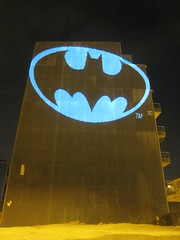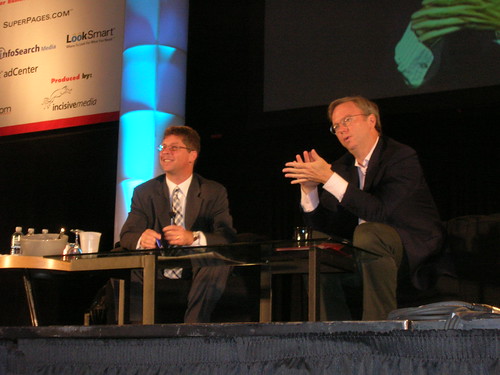Laser-Projected Graffiti Ads on Buildings
In yet another example of cyberpunk fiction turned to reality, the Graffiti Research Lab has assembled a mobile unit that can project messages (“graffiti”) onto the sides of any large structure using a computer, laser projector, and a bicycle-powered generator. They recently tooled around Barcelona doing this up until the police apparently ticketed them and confiscated the projection equipment. Looking past the mischievous fun of the idea, could this be a new trendy advertising medium, about to take Madison Avenue by storm? Guerilla marketing companies seem to think so – click through for more of my thoughts on the matter.

The Batsignal, by Graffiti Research Lab, Barcelona, 2007
Possible Related Posts
Posted by Chris of Silvery on 06/11/2007
Permalink | |  Print
| Trackback | Comments Off on Laser-Projected Graffiti Ads on Buildings | Comments RSS
Print
| Trackback | Comments Off on Laser-Projected Graffiti Ads on Buildings | Comments RSS
Filed under: Advertising, Futurism, Marketing Ad-Campaigns, Ads, Advertising, cyberpunk, Futurism, Guerilla-Advertising, Guerilla-Marketing
Will Google Keep Minority Report from Happening? Eric Schmidt’s Chat with Danny Sullivan
This morning at the Search Engine Strategies Conference 2006 in San Jose, Danny Sullivan interviewed the Google CEO, Eric Schmidt, in the conference’s main keynote session. Others such as the Search Engine Roundtable have reported on most of the content of that session, but one little thing Danny mentioned particularly grabbed my attention. Read on, and I’ll elaborate….
Possible Related Posts
Posted by Chris of Silvery on 08/09/2006
Permalink | |  Print
| Trackback | Comments Off on Will Google Keep Minority Report from Happening? Eric Schmidt’s Chat with Danny Sullivan | Comments RSS
Print
| Trackback | Comments Off on Will Google Keep Minority Report from Happening? Eric Schmidt’s Chat with Danny Sullivan | Comments RSS
Filed under: Conferences, Futurism, General, Google, Security, technology cyberpunk, danny-sullivan, Eric-Schmidt, Google, Philip-K.-Dick, PKD, privacy, SES-Conference
Through the Scanner Darkly
Seems strange, but there are only two degrees of separation between me and the late, famous, science fiction author, Philip K. Dick (“PKD”). If you aren’t familiar, Dick was the author of a number of stories which have since been made into major films such as: Blade Runner, Total Recall, Minority Report, and the recently-released film A Scanner Darkly. I’ve just got two degrees of separation from Philip K. Dick because of my “spare time” work on writing a soon-to-be-published book about two of his friends and protégés, Tim Powers and James P. Blaylock. In the course of writing that book, (A Comprehensive Dual Bibliography of James P. Blaylock & Tim Powers), I asked the authors questions about their old friend, Dick, and I spoke with other friends of his as well. He was apparently a very interesting character — brilliant, and more than a bit mysterious as well. PKD had a few unusual religious visions and appeared to suffer occasionally from paranoia and other schizophrenic bouts.
Last weekend, I got to see the most recent film inspired by a Philip K. Dick story, A Scanner Darkly, directed by Richard Linklater. The film was really great, telling a futuristic story of an undercover cop who becomes addicted to the drug of choice for his surveillance subjects, and then becomes required to spy on himself in the course of his investigation. The undercover cops all wear these camouflage suits which morph together features from millions of individuals to obscure their identies from others and from each other. The film is astoundingly well-made, and is pretty entertaining overall.
I saw that Nelson Minar, one of Google’s engineers, is also apparently a reader of PKD, and he blogged his impressions about A Scanner Darkly, too. He agrees that it’s good, though I disagree with him: he thinks it won’t appeal to people who haven’t read the book, and I think it will. It strikes too many chords with people, even today, and the actor’s humor in the early parts saves it from being too dry/boring.
Dick’s stories still seem relevant, over twenty years after his death. His stories contrasted realistic characters against a twisted reality where commercialism and technology seem to’ve evolved past a reasonable point. He played around with the nature of reality itself, and his work seemed to segue smoothly into the cyberpunk movement, which I previously posted about.
Possible Related Posts
Posted by Chris of Silvery on 07/18/2006
Permalink | |  Print
| Trackback | Comments Off on Through the Scanner Darkly | Comments RSS
Print
| Trackback | Comments Off on Through the Scanner Darkly | Comments RSS
Filed under: Futurism, General, Security, technology A-Scanner-Darkly, artificial-intelligence, biometrics, camouflage-suit, cyberpunk, flexible-display-screens, Futurism, James-P.-Blaylock, Minority-Report, nanotech, Philip-K.-Dick, PKD, science-fiction, Susumu-Tachi, Tim-Powers, Turing-tests
Towards a New Cyberpunk Reality
I recently discovered something interesting about my company, Verizon.
Do you remember the old Oliver Stone tv mini-series from the early 90s called “Wild Palms”? It was about a dystopian future of America where a fascist political group has risen to power, headed up by a senator who founded a new philosophy called “Synthiotics” or “New Realism”, which apparently involves the next stage of human evolution and virtual reality (VR).
The Senator, named Anton Kreutzer, owns a company named Mimecom which has developed some sort of advanced VR technology and 3-d display technology which they are about to deploy out to households through a television company, called Channel 3, in a new drama series they’ve named “Church Windows”. They seemed to be using Church Windows as a platform for propagandizing Synthiotic tenets, as well. The Senator is seeking one last piece of technology from Japan, a “Go Chip”, which will essentially give him eternal life, and seal up his political power. The Go Chip is named after the game of Go, an ancient Chinese strategy game that has been used by artificial intelligence researchers as a test case for building systems which can learn and immitate human intelligence (though, they don’t really spell out that AI tie-in during the series).
The Wild Palms series was likely intended to be a very cutting-edge, conceptual story that was inspired in large part by the cyberpunk movement in science fiction. One of the prime “founders” of the cyberpunk movement, the author William Gibson, actually puts in a cameo appearance in the series, as well. Oliver Stone likely intended the story to use semiotic literary devices as well, since many of the plot items and names seemed to be intended to have multiple layers of meanings.
Here’s where fiction begins to turn into reality. MimEcom was the name of an actual ecommerce/hosting/technology firm that was later started up in San Francisco, and considered IPOing in 2000, though the dot-bombs happened, and it halted plans to go public.
Later, MimEcom changed their company name to “Totality”.
In about 2005, Totality was acquired by MCI. MCI was merged into Verizon later on in 2005. The Totality part was folded under the Verizon Business division of the company. (more…)
Possible Related Posts
Posted by Chris of Silvery on 07/14/2006
Permalink | |  Print
| Trackback | Comments Off on Towards a New Cyberpunk Reality | Comments RSS
Print
| Trackback | Comments Off on Towards a New Cyberpunk Reality | Comments RSS
Filed under: Futurism, General ai, artificial-intelligence, cyberpunk, future, Futurism, Go-Game, Google, MCI, Mimecom, science-fiction, search-engines, search-pets, semiotics, technology, Verizon, virtual-reality, Wild-Palms, William-Gibson



